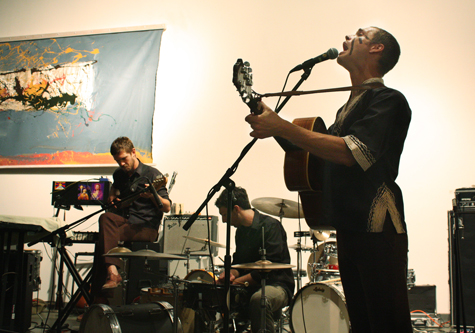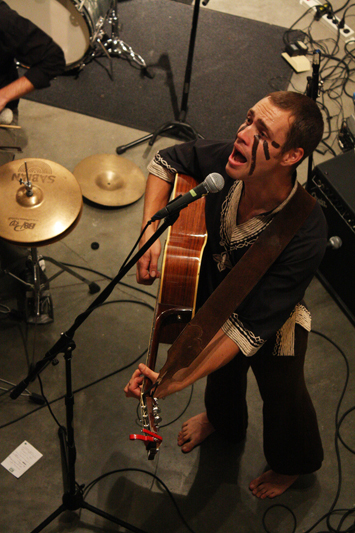 Photos by Laura Nevins
Photos by Laura Nevins
Dead Western
John Natsoulas Gallery, Davis
Aug. 29, 2009
Words by Vincent Girimonte
Last Saturday, the ever-embracing arms of Davis’ John Natsoulas Gallery welcomed some pysch-folkers, notably Sacramento’s Dead Western Trio, who played in support of Ben Chasny’s decade-long, discretely prodigious endeavor, Six Organs of Admittance. However, it was the local act who made the show somewhat remarkable.
The Dead Western Trio is a genuine spectacle, both visually and sonicly—each served the band well in a room four sizes too big, with other pieces of high art threatening to pry attention away from the makeshift stage. The high ceilings seemed more conducive to flying a kite than live music, but to his credit, Dead Western frontman Troy Mighty was shrewd enough to wear tights and war paint (the old one-two), perhaps to guard against wandering eyes.
Mighty approached the audience gently picking a guitar, strolling along with the bass and ambient percussion. With the addition of vocals, the music changed drastically, slumping down into an almost macabre tone. The simplicity of the acoustic guitar and bass gave room for Mighty’s calamitous baritone to let loose and emphasize each note. To be sure, an appreciation for the low and slow will help here; the pace never exceeded that of a funeral procession march.
Mighty’s voice—to some extent, Dead Western’s sound—may initially strike the listener as polarizing, engendering a queasy impulse. His clarity and the Trio’s instrumentation might be obscured by his vocal delivery, which has elicited all sorts of zany characterizations such as Big Bird lamenting on Dramamine. Crooning? Maybe Antony Hegarty with a few more Y-chromosomes.
Despite this, midway through his first number, the strange gap between Mighty’s vocals and the Trio’s music had been bridged thanks in large part to his words and the manner in which he employed them. The incongruous pair turned out to be a neat fit.
“Too often, I think, the voice is not recognized as the instrument that it is,” Mighty says, answering a few e-mail questions, “and therefore feels very separate from the music, rather than being rooted in and around it.”
The instrument he speaks of mouthed clear, articulate language, often overtly pensive with lines like, “Tell me how do you write a song that makes things meaningful? How do you reach inside the hearts of those you don’t know?” These are undoubtedly broad sentiments, which fringe upon tired at times, and Mighty doesn’t necessarily stray too far from them in his other tracks. But they surface as familiar and approachable and altogether committed.
Mighty on the not knowing: “I feel very sure about many things at this point; other things, not so sure, and this comes through in the honest songs that I attempt to write. It’s an ambiguity that I am very aware of, and am not afraid to present to others.”
Completing the Trio are bassist Jesse Phillips and percussionist Kevin Corcoran, who remained the steady, honest accompaniments on Mighty’s quest through the weird. And don’t be nervous about the percussionist, as was I; percussionists do shit drummers can’t, like tap fossils against a garbage can. But fortunately there were no wild forays into scraping cymbal solos and nobody, as far as I could tell, pulled out a skull. Corcoran knew what he was doing—an utterly refreshing quality for a percussionist and indicative of Dead Western’s refined sound. They made neat work of filling such a large room.
Dead Western’s Soften Your Screams into Sings is available on LP from KDVS Recordings. Suckle at the Supple Teats of Time will be released in 2010 out of Germany on Discorporate Records.


Comments